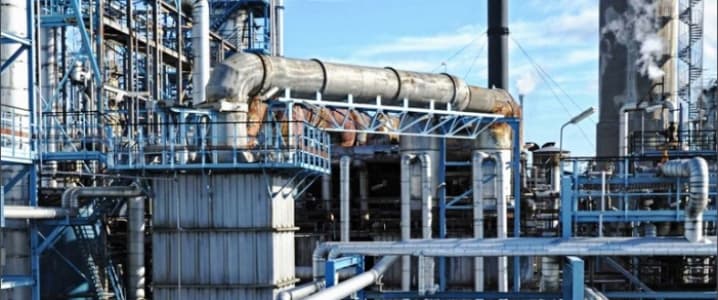Prolonged low oil prices— which have prompted all companies in the sector to rethink strategies and shore up finances —have not spared the wealthy Middle Eastern governments and their state-held energy firms. Abu Dhabi, one of the seven emirates of the United Arab Emirates (UAE), has been feeling the oil crunch and cutting spending to adapt to the new oil order. The lower-for-longer prices and the austerity drive had a ripple effect on Abu Dhabi’s state-run energy companies.
Now Abu Dhabi National Energy Company, known as Taqa, is reviewing its asset portfolio, and may sell some non-core oil and gas assets in the U.S. and Canada in a bid to restore some cash after posting its biggest ever loss last year.
In response to the low oil prices, Taqa wrote down $4.6 billion (16.9 billion dirhams) worth of oil and gas assets last year that resulted in a net loss of $5.2 billion (19 billion dirhams).
“We are looking to sell some wells and deploy that capital to core assets, and we are still committed to our core business in North America,” Saeed Hamad Al Dhaheri, acting chief operating officer at Taqa, told Bloomberg this week.
Speaking to Reuters, Al Dhaheri said:
“It is possible we may look to dispose of some oil and gas properties in the U.S and ... Canada.”
The manager, however, reaffirmed that Taqa has identified Central Alberta as a key asset in which it would invest more. Assets outside that area may be put up for sale, Al Dhaheri noted.
Although reviews are ongoing, “there are no current plans to sell any of our assets or exit from any of our existing markets,” the manager told Bloomberg in an email response to questions.
In North America, Taqa’s oil and gas business is focused on conventional oil and gas exploration and production in Canada. The company’s South Area of oil and gas assets includes properties in Southern Alberta, South West Saskatchewan, Montana, North Dakota, and Wyoming in the U.S. Taqa is also active in power generation in the U.S. and holds an 85 percent interest in a tolling agreement for the Red Oak power generation facility in New Jersey, and 50 percent in the Lakefield wind farm in Minnesota.
Taqa’s portfolio reassessment and its huge loss last year are the latest signs of the carnage that low oil prices have caused to the finances of the oil-dependent Middle Eastern economies.
Last year, Abu Dhabi National Oil Company (ADNOC) merged two of its offshore oil companies, Abu Dhabi Marine Operating Corp and Zakum Development Co, in efforts to consolidate assets, boost efficiency, and reduce costs. ADNOC also plans to merge three shipping companies, Abu Dhabi National Tanker Co, Petroleum Services, and Abu Dhabi Petroleum Ports Operating Co, by the end of this year.
Related: Alaska Needs Much Higher Oil Prices To Reverse Its Oil Fortunes
Abu Dhabi has also merged banks and state investment firms in its efforts to streamline costs. The emirate has just recently completed the merger between First Gulf Bank (FGB) and National Bank of Abu Dhabi (NBAD), creating a bank of some $186 billion of assets. Earlier this year, Abu Dhabi created the Mubadala Investment Company, after merging International Petroleum Investment Company (IPIC) and Mubadala Development Company.
Abu Dhabi’s total spending was cut by 10.3 percent last year and by 18.1 percent in 2015, Fitch Ratings said in January when it affirmed its AA rating and ‘stable’ outlook on the emirate. But the austerity has come at a price—non-hydrocarbon growth slowed down to 3.5 percent last year from 7.6 percent in 2015, “reflecting lower public sector demand, weak economic sentiment, tighter banking sector liquidity and effective exchange rate appreciation,” according to Fitch.
Due to the adherence to OPEC’s cuts, Abu Dhabi’s crude oil and condensate production is expected to drop by 2.5 percent this year to average 3 million bpd, following a 1.9 percent rise last year. Lower output would slow down the emirate’s real GDP growth to 1.0 percent this year, compared to estimated 2.6 percent growth last year, Fitch noted.
The current austerity measures in wealthy Abu Dhabi are in sharp contrast to the lavish government spending that took place prior to the oil price crash. High-paid expats—who are facing higher prices and higher costs of living than locals are—are leaving Abu Dhabi, as the emirate is reining in expenditures and levying higher taxes.
ADVERTISEMENT
If Taqa were to decide to sell some North American non-core energy assets, it could patch up some of its balance sheet after its biggest loss on record.
By Tsvetana Paraskova for Oilprice.com
More Top Reads From Oilprice.com:
- What Does The Future Hold For Canada’s Oil Sands?
- Oil Companies Exploiting Famine And Financial Ruin In South Sudan
- Oil Prices Fall Further As U.S. Rig Count Inches Higher


















